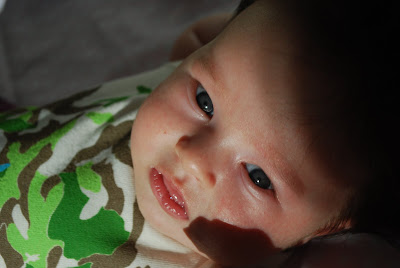
Hattie won’t remember her baptism. Or rather, she won’t remember it until she has a child and stands at their baptism to renew her baptismal vows:
“Do you reject Satan?”
I do.
“and all his works?”
I do.
“and all his pomps?”
I do.
“Do you believe in God, the Father almighty, creator of heaven and earth?”
I do.
“Do you believe in Jesus Christ, his only Son, our Lord, who was born of the Virgin Mary, was crucified, died, and was buried, rose from the dead, and is now seated at the right hand of the Father?”
I do.
“Do you believe in the Holy Spirit, the holy Catholic Church, the communion of saints, the forgiveness of sins, the resurrection of the body, and the life everlasting?”
I do.
“This is our faith. This is the faith of the Church. We are proud to profess it, in Christ Jesus our Lord.”
Amen.

Devin and I renewed these vows last Sunday. We witnessed both the promise and the responsibility of this sacrament as we stood by at the baptism of our first child. Our new little saint. And as the water dried and her mohawk re-erupted, Harriet had indeed become a little saint. That is, after all, what we believe--that the waters of baptism create a new Christian, cleansed by God’s grace from the stain of Original Sin.
As I spoke the baptismal vows on behalf of my child, my mind was drawn back to my own salvation, which I must continue to work out “in fear and trembling.”
Becoming a mother has forced me to realize--again, and in a new way--that I AM NOT MY OWN. My salvation, my personal holiness, is not merely “between me and God alone.” I stand as a mother at a child's baptism. I am responsible for another soul. In some real way Hattie’s faith depends on my own. I am one of the "great cloud of witnesses” who surround her. I must learn to be a holy witness in her life. I must learn to be a saint.

This work of love, this journey to holiness is difficult. Impossible even. As difficult and impossible as a camel going through an eye of a needle.
Yesterday I was reminded of this fact as I read this story which Thomas Merton relates in his book The Seven Story Mountain:
…[he] suddenly turned to me and asked me the question:
“What do you want to be, anyway?”
I could not say, “I want to be Thomas Merton the well-known writer […]” or “Thomas Merton the assistant instructor of Freshman English […],” so I put the thing on the spiritual plane, where I knew it belonged and said:
“I don’t know; I guess what I want is to be a good Catholic.”
“What do you mean, you want to be a good Catholic?”
The explanation I gave was lame enough, and expressed my confusion, and betrayed how little I had really thought about it at all.
[He] did not accept it.
“What you should say”—he told me—“what you should say is that you want to be a saint.”
A saint! The thought struck me as a little weird. I said:
“How do you expect me to become a saint?”
“By wanting to,” he said, simply.
“I can’t be a saint,” I said, “I can’t be a saint.” And my mind darkened with a confusion of realities: the knowledge of my own sins, and the false humility which makes men say that they cannot do the things that they must do, cannot reach the level that they must reach: the cowardice that says: “I am satisfied to save my soul, to keep out of mortal sin,” but which means, by those words: “I do not want to give up my sins and my attachments.”




















+008.JPG)
+011.JPG)
+016.JPG)
+020.JPG)
+040.JPG)